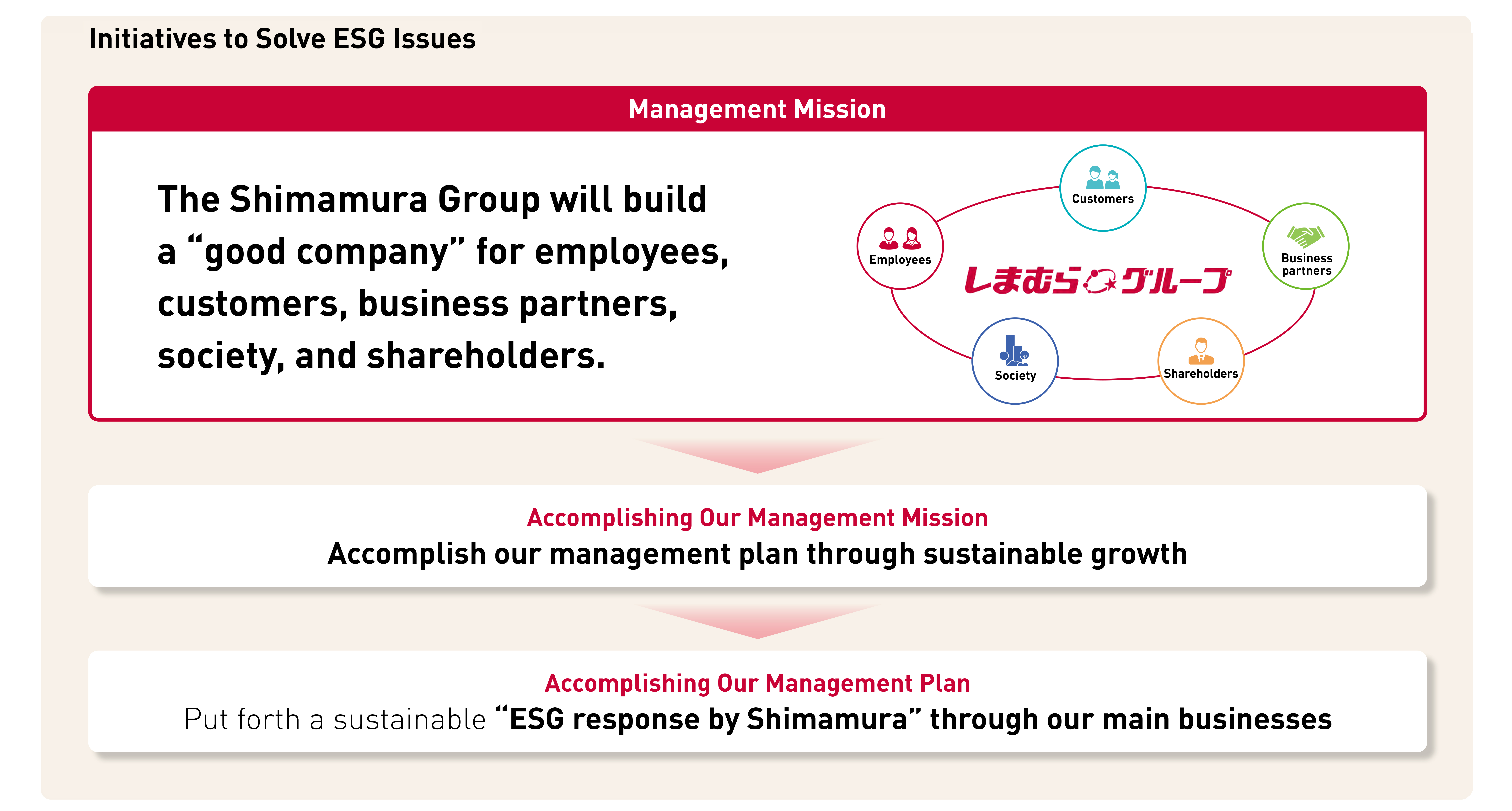Basic Policy, Priority Issues, Long-Term, Medium-Term and Annual Targets
Basic Policy
Based on our mission of building a "good company" for our employees, customers, business partners, shareholders, and society, the Shimamura Group is promoting sustainable "ESG response by Shimamura" through our main businesses in order to realize a sustainable society.

Priority Issues Related to Sustainability (Material Issues) and Long-Term Targets
To realize a sustainable society, the Shimamura Group treats various issues related to the environment, society, and governance at each stage of the supply chain as management issues and takes action to resolve them. Our management philosophy and mission align with the SDGs advocated by the United Nations, and we believe that our corporate activities and efforts to solve issues will aid in the achievement of these SDGs. We believe that nine of the 17 SDGs are particularly relevant to us and have established six priority issues related to sustainability that are connected to these nine goals.
| Material Issues | Long-Term Targets(FY2/2030) | Related SDGs | |
|---|---|---|---|
| Environment | ■Circular economy promotion | Reduce plastic waste |
|
| ■Reduction of GHG emissions | Continue with zero product disposal; evolve process | ||
| Reduction of GHG emissions | |||
| ■Sustainable procurement | Develop and promote sale of sustainable products | ||
| Demonstrate respect for human rights in supply chains | |||
| Society | ■Activities by diverse human resources |
Promote diversity |
|
| ■Enhancement of the roles of clothing infrastructure |
Enhance the role of clothing infrastructure (mainly for vulnerable shoppers) |
|
|
| Governance | ■Evolution of governance | Promotion of debate over the growth strategies and capital policy |
|
| Continuation and evolution of risk management | |||
| Fostering of successors | |||
| Ensuring diversity and appropriate scale of the board of directors |
Medium-Term Target
| Medium-Term Targets(FY2/2027) | |
|---|---|
| Material Issues | Initiative Items and Target |
| ■Circular economy promotion | Complete recycling ratio of hungers : 90.0% ※1 |
| Complete recycling ratio of plastics : 50.0% ※2 | |
| ■Reduction of GHG emissions | Continuation of zero product waste ※3 |
| GHG emissions (Scope 1 and 2) : 60% reduction (compared to FY2013) | |
| ■Sustainable procurement | Ratio of sustainable products : 40.0% ※4 |
| Continuation and evolution of suppliers' CoC compliance structure | |
| ■Activities by diverse human resources |
Ratio of female managers : 23.0% ※5 |
| Employment ratio of people with disabilities : 5.0% | |
| ■Enhancement of the roles of clothing infrastructure |
Sales target : 130 million yen ※6 |
| Implementation of traveling sales | |
| acceptance of shopping tours | |
| Expansion of online store | |
| ■ Evolution of governance | Promotion of debate over the growth strategies and capital policy |
| Continuation and evolution of risk management | |
| Fostering of successors | |
| Ensuring diversity and appropriate scale of the board of directors | |
- ※1 Plastic hangers in the Company's designated colors that come with products.
The target recycling ratio was changed due to the addition of new types of recyclable hangers and additional recycling locations. - ※2 Transparent plastic for product protection used at the time of delivery (made of polypropylene).
- ※3 Shimamura currently operates with zero product disposal. We will continue this trend going forward.
- ※4 Private brand (PB) products for the Shimamura business, the Avail business, the Birthday business, and the Chambre business.
To emphasize sales of sustainable products, we have changed the wording of our medium-term target from a purchase ratio of sustainable products of 40% to a ratio of sustainable products of 40%.
- ※5 Ratio of female managers in the senior class and above.
- ※6 Combined net sales from traveling sales, shopping tours, and the online store for senior adults.
Annual Targets
| Material Issues | Medium-Term Targets(FY2/2027) Initiative Items and Targets | Annual Targets (FY2/2025) Initiative Items and Targets |
|---|---|---|
| ■ Circular economy promotion |
Complete recycling ratio of hungers : 90.0% |
|
| Complete recycling ratio of plastics : 50.0% |
|
|
|
||
| ■Reduction of GHG emissions |
Continuation of zero product waste |
|
| GHG emissions (Scope 1 and 2) : 60% reduction (compared to FY2013) |
|
|
| ■ Sustainable procurement |
Ratio of sustainable products : 40.0% |
|
|
||
| Continuation and evolution of suppliers' CoC compliance structure |
|
|
| ■ Activities by diverse human resources |
Ratio of female managers : 23.0% |
|
|
||
| Employment ratio of people with disabilities : 5.0% |
|
|
| ■ Enhancement of the Roles of Clothing Infrastructure |
Implementation of traveling sale |
|
| acceptance of shopping tours |
|
|
| Expansion of online store |
|
|
| ■ Evolution of governance |
Promotion of debate over the growth strategies and capital policy |
|
| Continuation and evolution of risk management | ||
| Fostering of successors | ||
| Ensuring diversity and appropriate scale of the board of directors |
Sustainability Promotion System Initiatives
Sustainability promotion system: View details of initiatives
To achieve these targets, we have established an ESG promotion team that brings together various departments across the company and meets monthly to report on progress and raise awareness of issues.
